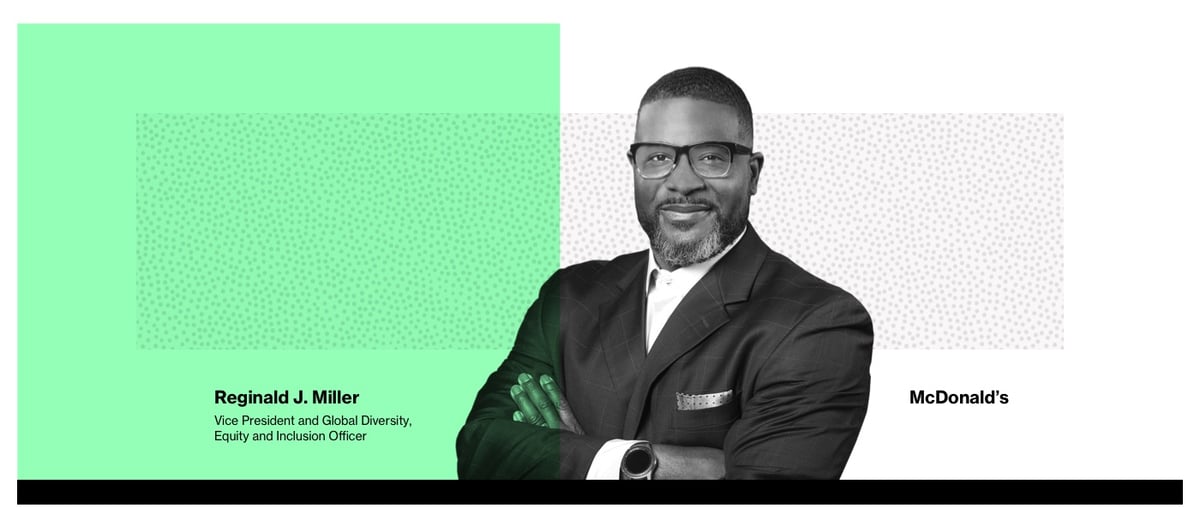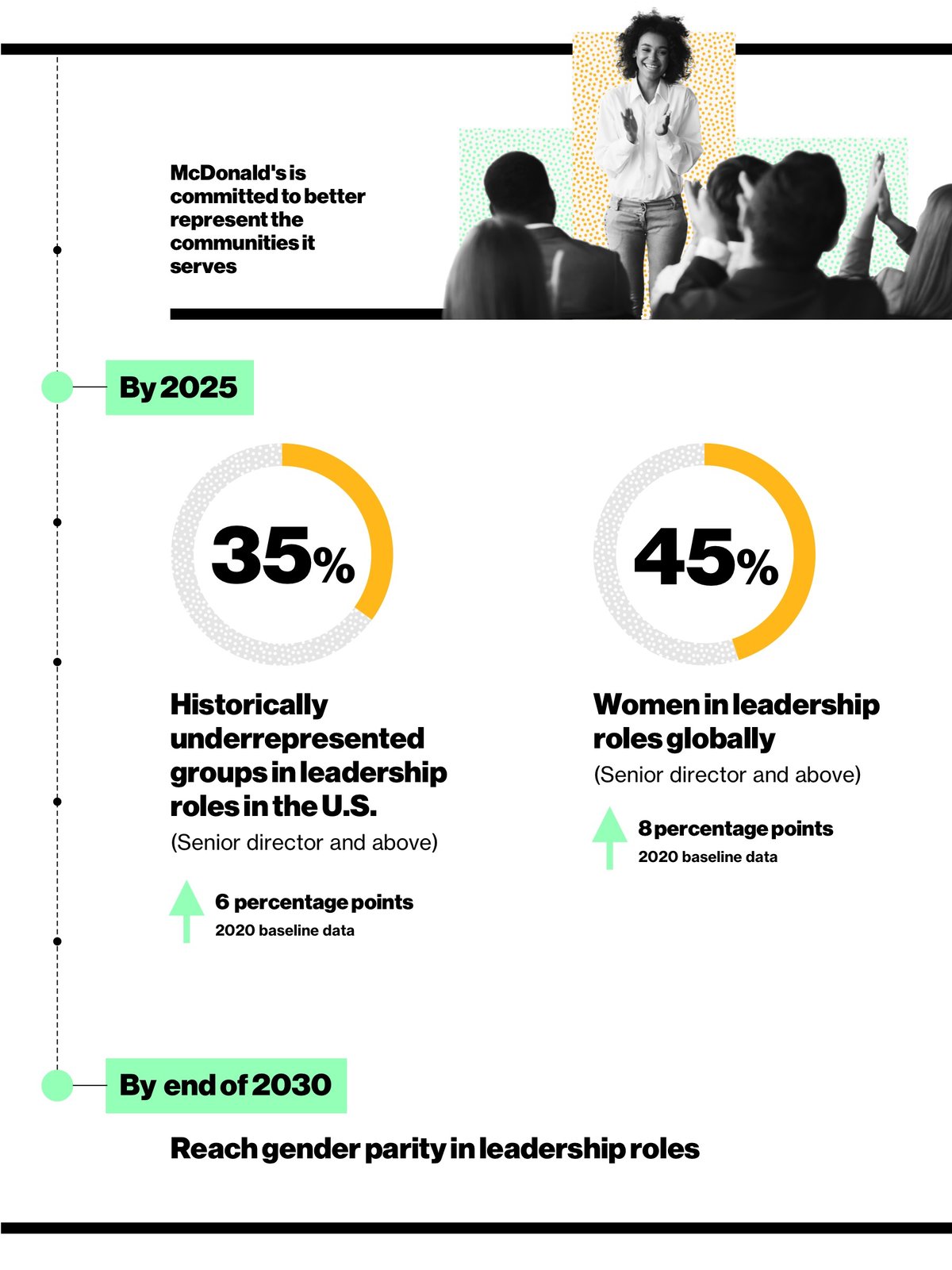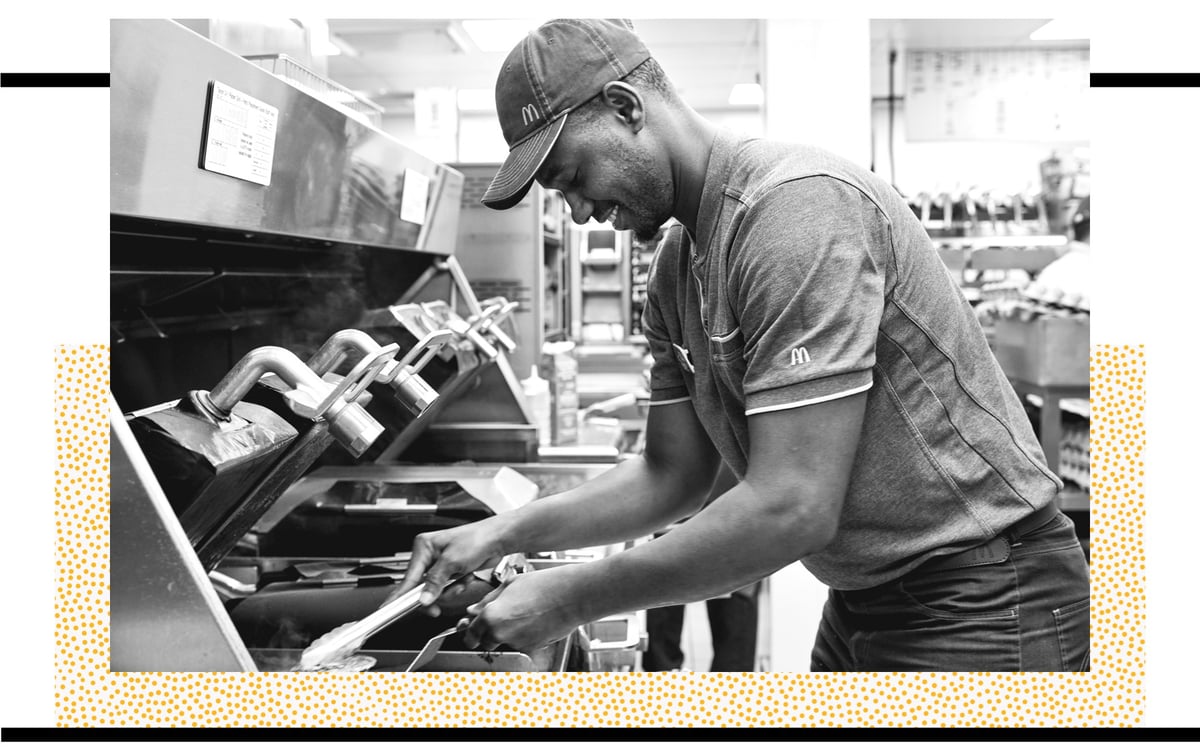
McDonald's Supports Diversity With a Global Footprint and a Local Touch
Reginald J. Miller, Vice President and Global Diversity, Equity and Inclusion Officer at McDonald’s, was a shift manager during his teenage years at one of the fast-food giant’s franchises in Osceola, Ark. That experience laid the foundation for the work that he now leads across the 39,000-plus McDonald’s brand restaurants worldwide.
“The people that I worked with back in those days were from all demographics, all walks of life—young, old, sexual orientation differences, different countries and different dialects.” Miller says. “You have to serve everyone, not only giving them the great customer service and food that you would expect but serving them as they expect. That’s inclusion. That’s equity. That’s belonging. So in a lot of ways, each and every customer touchpoint in our restaurants is an opportunity to live our commitment to inclusion each and every day.”
Miller’s early work experience also gave him his first lessons in leadership at scale, and how a massive global business like McDonald’s drives effective leadership that reaches the entire organization from shift managers to the CEO in a way that accelerates a culture of diversity and inclusiveness.
For decades, the Chicago, Ill.-headquartered company has maintained a Diversity and Inclusion strategy, but in the last 18 months there has been a new urgency to this work.
“Customers today want to know that the brands they love share their values and support causes that are relevant to them,” Miller says “When we’re faced with challenges, our values remind us how we serve and act, and that has been our barometer to address, for example, racial injustice, gender inequities and representation on behalf of our operators, employees, suppliers and communities.”
After joining McDonald’s in November 2020, Miller is already making his mark at the company. Here are five key initiatives that he’s driving at McDonald’s to accelerate leadership at scale around diversity, equity and inclusion.
1. Leadership Accountability
In February 2021, McDonald’s implemented Allyship through Accountability—the company’s effort to tie executive compensation to its diversity, equity and inclusion strategy—and, for the first time, the maker of the Big Mac released a full breakdown of U.S. staff in its offices and corporately-owned restaurants by race, ethnicity and gender.
McDonald’s is tying 15% of executive bonuses to meeting DEI goals, such as 35% of U.S. leadership roles (senior director and above) comprising underrepresented groups and women filling 45% of leadership roles (senior director and above) globally by 2025.
The company’s 2020 baseline data shows that 29% of its U.S. senior management (senior director and above) come from historically underrepresented groups and 37% of its senior management roles are filled by women. According to a recent Bloomberg analysis of 37 companies that released D&I data, only McDonald’s exceeded the U.S. population in its percentage of Black and Hispanic female executives and managers.
For Miller, tying executive compensation to diversity and inclusion goals is about living the company’s values.
“Our work is really focused on how we engage across the board, and not just having increased representation in certain areas,” he says. “We’ve taken a holistic approach that is focused on three key drivers: How do we represent the diverse communities in which we operate? How do we accelerate cultures of inclusion and belonging? And how do we dismantle barriers to economic opportunity?”

2. Driving change throughout the ecosystem
As some of the largest companies within their own industries, suppliers have the power to accelerate the changes that McDonald’s wants to see within their leadership and the communities they serve.
“What I’ve seen in my very short, few months here has been just a tangible level of excitement from across the entire McDonald’s system,” says Miller. “Our collective scale can drive tremendous change, and our supplier community is very, very energized in regard to being part of the journey that we’re on.”
DEI has long been reflected across the company’s business RFP processes, business reviews and key supplier policies to ensure that McDonald’s partners share the same commitment, energy and investment in accelerating change.
Over the next four years, McDonald’s and its franchisees are accelerating the allocation of advertising dollars to diverse-owned media companies, production houses and content creators. The company’s total investment in Black, Hispanic, Asian-American, women and LGBTQ-owned platforms—will more than double, moving from 4% to 10% of national advertising spend between 2021 and 2024.
3. Defining your role in the community
With the social and racial unrest of the summer of 2020, many major brands felt the pressure to respond immediately. How leadership responds in these times of crisis is often the greatest measure of their performance.
Miller says that McDonald’s defined purpose—to feed and foster communities—and its values of service, inclusion, integrity, community and family guide how the company responds and communicates during a crisis. McDonald’s adopts a local strategy to speak for the company’s values and stand with its communities, focusing on substantive communications to the company’s most critical audience—its staff and restaurant crew. If it matters to them, it matters to McDonald’s, Miller says.
To build this community-level engagement, McDonald’s supports impactful community organizations, including the National Urban League, the NAACP, Thurgood Marshall College Fund, Stop AAPI Hate and OCA-Asian Pacific American Advocates, Hispanic American Commitment to Education Resources, Reach Higher, PUSH Excel, Disability:IN, Out and Equal and GLSEN, many of which have been long-standing partners.

4. Embedding DEI into your culture
Trust is one of the most important aspects of building leadership at scale. Leaders bring different management styles and, invariably, many will leave a company over time. A new leader may not trust the process of their predecessor and overturn the progress that has been made to shape the work in their image. For Miller, the work around DEI must be so deeply embedded in an organization’s culture that it will survive through change.
“That doesn’t mean that the leader won’t alter it to some degree—but the culture is what has lived on through McDonald’s all the way back to our founder, Ray Kroc, and it continues to be showcased today,” he says. “And so I’m standing on the shoulders of the people who have come before me, and that is how inclusion really does cement itself in our culture.”
In 2020, McDonald’s legal department took a decisive step in promoting DEI by committing to the Mansfield Rule: Legal Department Edition (MRLD), which requires legal departments to consider at least 50% lawyers from underrepresented groups for permanent and outside counsel hiring, promotions and high-visibility professional opportunities.
“We have to do things that are aligned with our values, because our own teams will hold us accountable when we start to stray outside of who we are, who our culture is and the things we have stated that we’re going to do,” Miller says. “That’s where we’re going to ensure that we continue to build trust with those that work for and with us, but also build trust with our consumers as well.”
5. Credibility is something that is earned
Over and over, Miller stresses the importance of embedding DEI into the fabric of the company, but he is careful to note that reaching leadership at scale is something that must be built.
“From a leadership accountability standpoint, that’s something that takes time because you don’t just walk in the door and say, ‘Hey, I’m credible,’” he says. “It’s something you have to build. It’s something that’s earned. It’s something that you establish with trust.”
McDonald’s implemented Global Brand Standards, which prioritize actions in the following areas: harassment, discrimination and retaliation prevention; workplace violence prevention; restaurant crew feedback; and health and safety.
All 39,000 McDonald’s restaurants, both company-owned and franchisee locations, in more than 100 countries will be required to adhere to these standards, helping to ensure that everyone who works “under the Arches” shows up each day to a safe, respectful and inclusive workplace—one that empowers and inspires them, provides access to continuous learning and development, and allows for a job that integrates into their life.
For Miller, the litmus test of DEI progress is not when he hears the CEO or the senior leadership team talking about it, but when he visits a McDonald’s restaurant and the crew is talking about the diversity of their team and the diversity of people in leadership and their own feeling of inclusion and belonging in the workplace.
“That’s when you can tell, when throughout the entire organization you see representation of the communities we serve—that’s when we know we’re really making a difference to accelerate a culture of inclusion and belonging,” Miller says.
